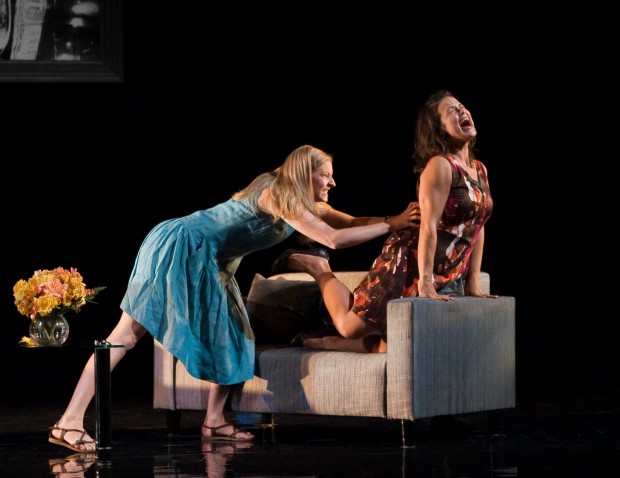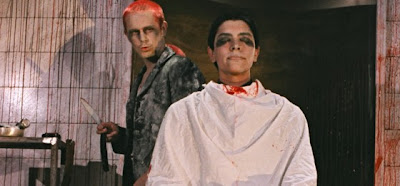Dear Old Farts,
You are absolutely right: “The issue is far larger than the firing of one AD”.
This is perhaps why you don’t see as many young members of our arts community getting up in arms about the firing of one AD as you might like. It’s not because we’re apathetic, it’s because we’re busy fighting those bigger issues and making art.
We’re opposing our governments at all levels. There are those who wish to corporatize the arts, and those who wish to politicize them, either by cutting funding or by moving resources away from arms-length funding bodies and into community events and festivals where the risk of political or dissenting art is low. And, in some cases, not allowed.
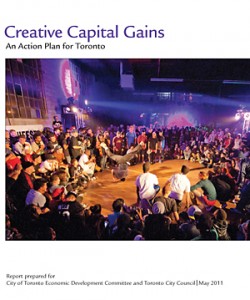 We’re engaging in municipal processes that are supposed to be about creating new culture plans for our city, to determine cultural priorities, how money should be invested, how best to build and maintain a cultural ecology. We wrote about those consultations extensively here on praxistheatre.com. While I tweeted live from many of them, I was surrounded by young, active, vocal members of our community. Though I must say, it is rather dispiriting to realize you’ve been invited to contribute to a document that was written before you arrived.
We’re engaging in municipal processes that are supposed to be about creating new culture plans for our city, to determine cultural priorities, how money should be invested, how best to build and maintain a cultural ecology. We wrote about those consultations extensively here on praxistheatre.com. While I tweeted live from many of them, I was surrounded by young, active, vocal members of our community. Though I must say, it is rather dispiriting to realize you’ve been invited to contribute to a document that was written before you arrived.
Throughout those rooms the voices present asked that the city talk about art not just in terms of financial investment and return, but about the less tangible contributions that a healthy cultural community can offer a vibrant city. You’ll not see any of those voices included in the new culture plan. When it became clear that any voices in opposition to “creative class theory” would not be included in the report, I asked that my name be removed from the “Consultation Participant List”. I was not consulted, and nor were many of the people in those rooms.
We’ve been speaking up about our own professional association that was built based on old models of making work that no longer reflect today’s realities. Young artists often find the Canadian Actors’ Equity Association to be one of the biggest roadblocks to the development of their work, another issue we’ve written about extensively. You’ll find no apathy on this topic. Younger artists have been working together for years to bring change to this important but out-dated organization, and that work is hopefully about to pay off, despite the fact that some of the old farts have been vocally opposed to reforms that would empower the younger generation of theatre-makers.
The Toronto Indie Caucus is made up of “emerging” and “submerging” artists alike and populated by some of the most driven and passionate young people in this community, and it continues to grow. The work of these artists has contributed to some highly significant votes for change within the association, the development of an Independent Theatre Review Committee, and a possible new indie agreement on the horizon. Let’s hope these extensive consultations to which we have lent our voices will actually take those voices to heart.
We have also spoken out about Luminato, our most recently created arts festival. It was not created by a collective of artists, but by two Toronto businessmen who used their connections with the government to get millions of dollars in funding to create an arts festival as a way of luring tourist dollars back to the city after the SARS crisis. They wonder why, after 6 years they’re failing to find a dedicated audience, community support or “brand awareness”, though I don’t suppose I need to remind our readership that their most recent season included no Toronto theatre artists in its lineup.
And finally, we’re fighting those very structural models upon which the Factory Theatre, and companies like it, is based. For years, arts organizations have been forced to fit into a certain mold in order to appease the various funding bodies. So we’ve incorporated, we’ve set ourselves up as not-for-profits, we’ve created our boards of directors, and we’ve gone after charitable status. This worked for a number of years while there was enough money to go around, but that’s no longer the case.
So we’re researching, we’re investigating best practices in other cities, and some of us are working with Arts Action Research in a program called Theatres Leading Change, which is all about discovering new models that are best for the work that we create, and the way we go about creating it.
When we’re asked to consult, we show up. When there are debates and votes happening at City Hall, we’re there too. When Equity tries to bully us, we get together and push for reforms. When our institutional leadership fails us, we speak out. Also, when elections happen, many of us work our arses off canvassing, letter writing, phone calling, and video-making.
This is not apathy, but a quiet community of passionate and dedicated artists working away at changing what no longer works. I am not silent, I sit on no fence, and I am not complicit. I’m just offering my voice to a different fight.
In “The Empty Spaces, Or, How Theater Failed America”, Mike Daisey had this to say:
“I’ve gone drinking with the artistic directors of the biggest theaters in the country and listened to them explain that they know the system is broken and they feel trapped within it, beholden to board members they’ve made devil’s deals with, shackled to the ship as it goes down. I’ve heard their laughter, heard them call each other dinosaurs, heard them give thanks that they’ll be retired in 10 years.”
So yes, you’re right, this issue is larger than one AD, and those bigger issues are the ones we’re trying to tackle.
Yours in action,
Aislinn Rose
]]>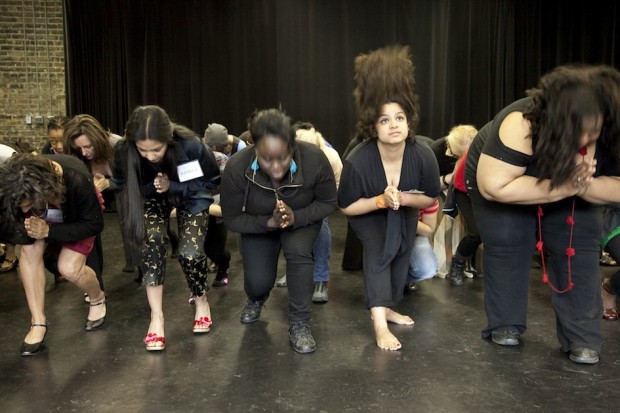
In 2011, Luminato had multiple local shows including Necessary Angel's Tout Comme Elle, pictured above, which had a cast of 50 Toronto theatre artists.
by Michael Wheeler
Welcome to the re-vamped praxistheatre.com. It was almost four years ago that I wrote my first major post for Praxis. It was titled Lumi-not-go and was a response to the festival not being responsive to what the needs of the artistic community needed when it invented itself one fine morning. It was followed up by a critique that looked at how else the money used to create the festival could be spent titled, How Luminato Failed Toronto. Yes, I have been ripping off Mike Daisey for that long.
A lot has happened in this space and my involvement with Luminato since that time. I ended up working over three years at different times as Artistic Producer in Training, Online Coordinator and Assistant Director on Volcano Theatre’s The Africa Trilogy, which was likely Luminato’s most successful locally created work. The festival put real money over an extended period of time into a piece of theatre that combined international calibre directors and playwrights with local actors and designers in a massive experiment that was the hit of the festival. I blogged the heck out of it on praxistheatre.com.
The whole thing went so well that last year Luminato invited me back to do a seminar for staff on effective cultural blogging, especially in support of the multiple local shows in the festival. It was a feel-good story about how a critique can lead to the incorporation of real change. It felt like Luminato had listened to the community that it was supposed to foster and be a part of.
All of that seems to have gone out the window with Wednesday’s announcement that Luminato would have zero local content in the theatre, dance and opera department in 2012. It’s like they completely forgot that they live in and are part of a community (again). Until major organizations recognize they are part of a larger ecosystem and have a role to play, we’re probably doomed to mediocrity. Do they not see renting talent instead of growing it is an unwise investment?
When The Playhouse closes in Vancouver, the silver lining that no one wants to talk about is those public funds that support it can go back into the pot at least. When Luminato operates this way – which I’m sure the Heritage Minister will cite later as increased funding – we lose twice. No opportunity – and less access to investment to do it ourselves.
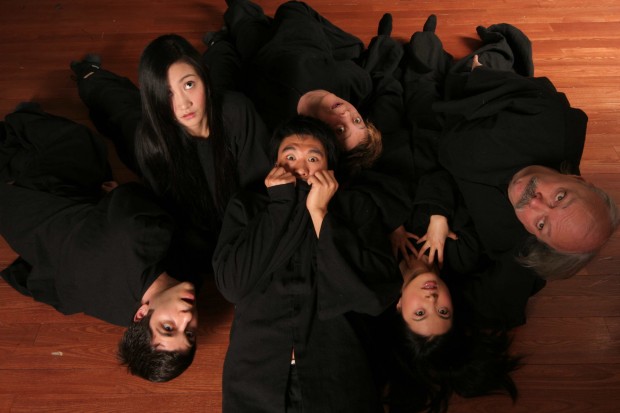
Just like The Africa Trilogy, Theatre Smith-Gilmour's Lu Xun Blossoms (2011) contained local and international artists.
The other big losers are Torontonians. High-end theatrical performances tend to be quite expensive, so you better have some cash if they want to see Robert Wilson and Philip Glass re-live past glory. Meanwhile the local talent that exists here the other 355 days of the year will be no better off than before. Paying top dollar for high-end touring acts does not make you a world class city, don’t let a free concert or two fool you. What does it say to the world that we don’t even care to promote or present our own theatre? It does not scream sophistication.
Luminato has a new Artistic Director this year, Jorn Weisbrodt. Much of what we’re seeing is not his choosing, although it will be his job to stand behind it. His quote on the homepage of the Luminato website seems to indicate that programming work from Toronto is something he sees as part of his mandate:
“Luminato is Toronto’s fifth season when the festival stages the best of our city and invites the world to celebrate and transform it with us.” (Emphasis added)
My question for him is quite simple: Where from Toronto stages is “best of our city” at Luminato in 2012? The question for us is: How do we reach him so he will seriously consider the role of Luminato in the context of the community and cultural ecosystem the organization exists in?
It’s time to start the business of investing in local talent and actually making Toronto a hotbed of groundbreaking works 365 days a year. This is going to be messy, confusing, non-linear, and wholly worth it if key players would show the leadership to make it happen.
*The updated and upgraded praxistheatre.com is brought to you by the incomparable Graham F Scott. Thanks Graham. You Rock.
]]>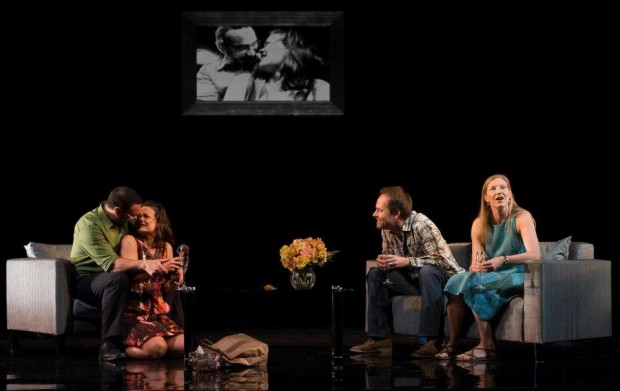
Peggy Pickit Sees the Face of God - Tony Nappo, Kristen Thomson, Tom Barnett and Maev Beaty. Photo by John Lauener
by Michael Wheeler
I realize it is a little strange as the Co-Artistic Director of Praxis Theatre and Editor of praxistheatre.com to publish a blog post about the best play I’ve worked on so far and for it not to be a Praxis Theatre show – but there’s PR and then there’s an attempt at truth. Hopefully people read this thing because we appreciate the latter over the former in this space.
Over the past three years, with the generous support of two grants from Theatre Ontario, I have been a participant in Volcano Theatre‘s The Africa Trilogy – which premiered last year at Luminato and became Another Africa this year at Canadian Stage.
This participation has taken number of forms; first as Artistic Producer Trainee with artistic and producing duties on all three productions, which I blogged about extensively on praxistheatre.com in a seven part series, and then as the creator and curator of The Africa Trilogy Blog.
Both of these experiences were immensely rewarding. In terms of gaining an intimate detailed understanding of how an ambitious international collaboration goes from idea to reality (praxis) they were invaluable.
There could be no better education in creating original plays than the opportunity to experience directors Ross Manson and Josette Bushell-Mingo, cast, dramaturge, choroegraph and stage new works by new voices in theatre.
In particular, seeing Shine Your Eye, the first dramatic work by Binyavanga Wainana, (just pronounced this week by Forbes magazine as one the 40 most powerful celebrities in Africa) come to life as a thoroughly contemporary African perspective on Africa, expanded my understanding of theatrical potential.
The majority of my work over three years and seven (yes seven!) rehearsal processes was as Assistant Director working alongside director Liesl Tommy and choreographer Heidi Strauss on Roland Schimmelpfennig’s Peggy Pickit Sees The Face of God.
Developing a World Premiere of a Schimmelpfennig text over 2008-2011 has inspired two extremely vibrant emotions in me:
1 – Pure inspiration: I remember walking home from a read-through of the play sometime in the second workshop in 2009 with a deep suspicion that, assuming we are still here on earth, this text will be performed in fifty years by Norweigan high schoolers, community players in Austin Texas, and subject to a number of revivals.
There’s nothing quite like being sure what you are doing is important and may possibly outlast you.
2 – Absolute dread: As an artist literally in training to have responsibilities connected to the success of this a once-in-a-lifetime text was intimdating to say the least. When I found myself rehearsal director of a workshop to review blocking and camerawork from Luminato with new Canadian Stage cast members Tom Barnett and Kristen Thomson in April, it was frankly the most pressure I have put on myself.
I watch enough sports to know sometimes guys make The Stanley Cup in their rookie year and that’s the only shot they ever get.
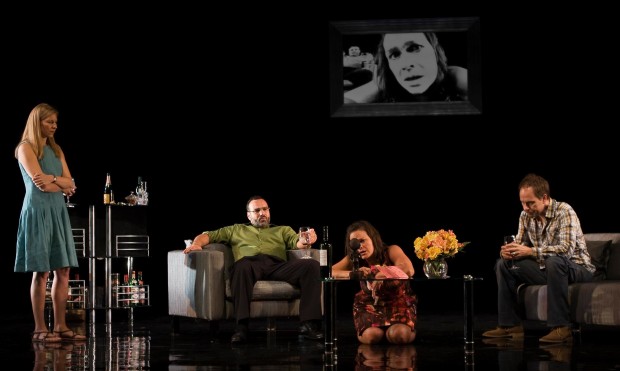
Peggy Pickit Sees the Face of God - Maev Beaty, Tony Nappo, Kristen Thomson, Tom Barnett. Photo by John Lauener
If you can’t tell, I am immensely proud of this play and there is a week-and-a-half left to catch it. You can get some seriously cheap tickets: Under 30: $12.50, PWYC Mondays, and $22 Arts Worker opportunities are all in play.
Click here for full details on cheap tickets, and click here for the Another Africa show page.
If you enjoy new performance that pushes the potential and form of live storytelling I hope you will come. Don’t make it one of those shows you meant to see but things were crazy in the fall, yadda, yadda, yadda. If you come this Friday October 14, Volcano Theatre General Manager Meredith Potter will be talking in more detail about creating the production in the second floor lobby at 7:15pm before the 8pm curtain.
That’s it. That’s my pitch. Thanks to Volcano Theatre for the unprecedented trust and opportunity and to director Liesl Tommy for giving her assistant director real things to do. Hope you can make it.
]]>
Image by Wellington Grey - Click to enlarge
by Michael Wheeler
Here are 3 internet/performance-related things I am up to. They’re all completely different and have me thinking about how different people – playwrights, young artists and audiences – can interact with the the internet and performance.
Also, I still like to direct plays and will talk about that from time-to-time too.
Playwrights Guild of Canada (PGC) has asked me to give a seminar on – wait for it – Social Media in the Arts.
Today, as part of ‘PLAYWRIGHTS: Getting Down to Business’, a day of professional development workshops for playwrights organized by PGC, we will discuss social media as it relates to the Canadian playwright. What advice would you give playwrights about how to use social media these days? Leave your advice in the comments before 3pm and maybe we will end up discussing it.
This summer I am leading a FREE program for youth at The Theatre Centre on – you guessed it – online tools and performance.Dates: Monday July 25 – Friday July 29 Time: 10pm -2pm Age: 15-19
This FREE program includes free LUNCHES and a TRANSIT subsidy in an exploration of what tools are available on online, what stories the participants are interested in telling, and how to tell them on the stage in new and exciting ways. Throughout the week, resident companies at The Theatre Centre will join the workshop giving participants a rare window into how cutting-edge artists are working with the newest technologies to create their work. Click here to sign up or learn more.
Work is ongoing with Theatre Smith Gilmour as they move ever closer to their North American premiere of the first ever Sino-Canadian co-production Lu Xun Blossoms at Luminato.
The latest post explores who Lu Xun was (Western audiences can understand him as having many parallels to Chekhov). Luminato has also launched their own Smartphone Ap to keep track of everything that is going on when the mega-festival hits town, which means you can now also buy tickets instantly via the small computer many of us keep in our pockets.
This weekend I will be participating in Directors Lab North, which fosters a national and international exchange between a community of emerging, mid level and established career directors created by alumni of the Lincoln Center Theater Directors Lab in New York City.
My involvement is contributing to a panel that also includes Obsidian Theatre Artistic Director Philip Akin and Modern Times Artistic Director Soheil Parsa. We will NOT be discussing the internet. Mostly we will be talking about theatre, aesthetics and identity. Although Philip has been an early adopter of the The Blog, so you never know. Also I guess my aesthetic in some way involves the internet. Never mind.
]]>by Michael Wheeler
* Strombo lays it down. I’ll be honest: I don’t watch alot of Strombo – what with him running concurrently at 11pm with the two greatest political satirists of our age – but you gotta hand it to him for this monologue on what will happen to internet access in Canada if the CRTC’s current ruling is implemented, what’s behind it, and how you can get involved on the side of OpenMedia.
*Someone let Richard Florida back in the building! Maybe it’s gauche to link to my own interview – but I just suggested to NOW Magazine’s Jon Kaplan that the best thing about cultural policy in Toronto under Rob Ford was that we finally had an opportunity to move beyond the widely discredited ‘Creative Economy‘ theories espoused by Richard Florida that gained prominence during the David Miller administration. Guess not: Last week Florida was announced as advisor to a new City Hall panel to update Toronto’s culture plan called The Creative Capital Initiative. Something tells me we might have another ‘cultural renaissance’ on our hands. More on this as it develops – there are some smart people on the panel.
* Canadian Actors’ Equity Association (CAEA) and the Professional Association of Canadian Theatres (PACT) have announced a new trial program geared at creating a reasonable way to contract new play creation. I know, you’re bored already. If you make new plays in Canada don’t be. The Tangerine Contract has the potential to fundamentally change the way you create work – dividing the process into four creation stages and providing the option to work by the hour instead of by the week. More news on this as it develops. Fingers crossed that this trial goes well and that artists, producers, and artist/producers enjoy working under it.
* Theatre 20 announced their intention to take the success of musical theatre in Toronto into their own hands: 20 established musical theatre artists from multiple generations have come together to start their own company that will create homegrown hits. Looks like they are getting some assistance from the Mirvishes including use of the Panasonic Theatre on Yonge St. It seems like this will go somewhere. I wonder if they will use the Tangerine Contract to make new works?
* The Tarragon Theatre opened the Toronto Stock Exchange? Yep it’s true. One good thing about theatre people is that they are very good at clapping.
* Luminato Artistic Director Chris Lorway announced he is stepping down. No word yet on what that means for the festival or what comes next. I for one am bummed about this as Chris was always quite supportive of this website and my work – even though praxistheatre.com gained some of its credibility and noteriety from a series of posts about the high degree of B.S. that led to the creation of Luminato in the first place. Proof that a structural, policy-based debate need not be a personal one.
]]>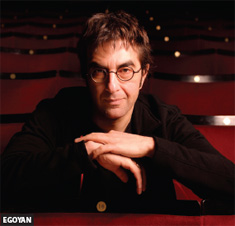
by Michael Wheeler
“This city is envy of the world and we’re acting like it’s falling apart.”
Filmmaker Atom Egoyan speaking as an observer at the launch of the non-partisan One Toronto movement to reduce the prevailing negativity of the mayoral campaign, and to encourage those Torontonians who support inclusive values to become engaged and involved.
I wonder if representatives from The Canadian Federation of Students (CFS), The United Way, and Luminato have ever sat at the same table before?
The broad-based support for this campaign impacted me more than the rhetoric for cameras at the One Toronto media launch. Certainly all the right things were said: There was a call for thoughtful non-partisan dialogue, respect for inclusive values, and a Toronto where anyone can succeed. This was expected. What was unexpected is how varied the groups backing this initiative are.
Look let’s be honest here: Luminato is more of a centrist Ontario Undergraduate Student Association (OUSA) kind of organization than a natural CFS ally – and the CFS has more of a Fringe Festival vibe than a Luminato one. Yet this is not the time for what become trivialities in the face of an almost unthinkable municipal administration that would decimate both culture and students with little regard for these distinctions.
Clearly it is time to make some new friends and work together. The distinct possibility of political apocalypse makes for strange bedfellows and a strikingly broad base of support that cuts across traditional fault lines in civil society.
One Toronto organizers are proposing Torontonians ask candidates what they would do specifically (no platitiudes) about three core issues that SHOULD be dominating the debate, but are being lost in sea of angry populist disaster porn: 1) Climate Change, 2) Inclusiveness and Equality, 3) Services and Programs. This is pretty wide ranging stuff you would think is a no-brainer, but is getting absolutely no play in the race right now.
 This election will be decided by a ballot question that has not yet been set. Currently the question is: “Do you want Rob Ford to dismantle City Hall?” If that remains the question, he almost certainly will win. If the question becomes something else, something positive that addresses all of the ways municipal government can engage with and improve our lives as Torontonians, his chances of winning decrease significantly.
This election will be decided by a ballot question that has not yet been set. Currently the question is: “Do you want Rob Ford to dismantle City Hall?” If that remains the question, he almost certainly will win. If the question becomes something else, something positive that addresses all of the ways municipal government can engage with and improve our lives as Torontonians, his chances of winning decrease significantly.
As we have seen from the discussion still going on in the comments to Monday’s post, strategy and picking a single mayoral candidate will play a big role in how this all plays out. Just as important as WHO people vote for is WHY they vote for someone though. This is an area we have a lot to work on in a short period of time. Fortunately a week is a lifetime in politics, which means we have five lifetimes to change the tone and topics of this debate.
One Toronto has called an upbeat, completely positive, Emergency Community Meeting for Monday September 27th from 7:30pm to 9:30pm at The Church of The Holy Trinity (Behind the Eaton Centre).
Facebook page here. Facebook event here. See you there.
]]>
While Praxis Theatre became super-obsessed with our own product and process for a week, lots of other things have been going on:

This week’s federal budget contained few surprises, but there was one item that came out of left field, shocking the cultural sector: Luminato founders David Pecaut and Tony Gagliano, pictured above, have been granted $25 Million to create the Canada Prizes for the Arts and Creativity.
A number of artists have expressed ire that this announcement comes on the heels of the cancelation of the PromArt program, abandoning the federal government’s commitment to promoting Canadian artists abroad. This new money will be used to host a pre-Luminato competition, where prestigious panels of judges will adjudicate international competitors in the fields of dance, music, art, and dramatic arts. The winner gets cash and a slot in the two-year-old festival that recently received another unprecedented $15 Million donation from the Ontario provincial government. New Conservative Minister of Heritage James Moore calls The Canada Prizes “the largest cultural prize-giving in the world“.
What do you think? Is this a genius ploy to make Toronto an international hub for arts and creativity? Is this a genius ploy to to fund culture without rewarding Canadian artists for depriving the Conservative government of a majority in the recent election? How the heck do these two dudes get multi-million dollar grants from any level of government that no one else can apply for?
]]> By Michael Wheeler
By Michael Wheeler
Question:
You have a $10,000 a year budget for transportation.
You:
A) Rent a Lamborghini Countache for ten days, and drive it around like hell. Walk everywhere the other 50.5 weeks of the year.
B) Get a sensible sedan on a 12-month lease.
C) Alternate between a transit pass and bicycle. Use the savings to do something interesting.
This was my response to a co-worker who had seen BlackWatch the previous evening. He told me that although they had initially agreed with my earlier Lumi-not-go post, after seeing the production he had come to a different conclusion about the value of the festival. Anything that brings something that good to Toronto must be a good thing.
I really like Lamborghini Countaches too. A long time ago I had a poster of one above my bed. But option A is clearly ludicrous. It’s the same reason why spending $21.5 million over three years on an international festival that bring some of the best artistic work in the world to the T Dot for a short, extremely well publicized run, is also a very poor, frankly ignorant, decision.
Theatre at every level but the best of the most established institutions is in bad shape in this city right now. There’s a myriad of reasons for this best saved for another conversation, but the short version is as follows:
Mike Daisey is right and it’s the same situation up here. Being a theatre artist has ceased to become a profession you can make anything approaching a respectable living at in Toronto for all but handful of our very top practitioners. These lucky folks are still often working 12-hour days and six-day weeks for much less than what any of our non-thesbian friends make. Many of them probably do a little catering on the side to make ends meet. The earth is scorched. Anyone who puts economic well-being in their top-ten list of personal priorities would not come within a stone’s throw of this scene.
Yes, the theatre has always been in trouble. Yes, making art is hard. But the current theatrical economy is a graveyard for anyone who may have to pay bills, rent or student loans. We can see this in what has become of our grassroots institutions, places where the new generation of artists rehearse and perform:
Artword Theatre – gone.
Alchemy Theatre – gone.
Poor Alex Theatre – gone.
Equity Showcase Theatre – going, soon to be gone.
Not only are there few resources to create work, there is no longer anywhere affordable to put shows on.
In the wake of this grim reality, a couple of corporate head honchos who seem entirely unaware of any of this, waltzing in and deciding that they know best with what to do with the first increase in public money that’s been available to the performing arts in some time is a recipe for disaster. Lavishing much of those resources on smash hit shows from other places – a fellow indie theatre producer described it to me as, “putting makeup on a corpse.”
Of course BlackWatch was amazing. Not only is Scotland, at roughly the size of New Brunswick home to the world’s premiere Fringe Festival, it has 300 youth theatres. Just for youth. The very best end up at the national chapter, The Scottish Youth Theatre. Many in the BlackWatch cast went through that system. The show represents the tip of a very large iceberg. The country has invested heavily in value of theatre and it is paying dividends – literally. It gets to tour to high-paying international festivals that rent the tips of other peoples icebergs because they don’t want the trouble of building their own.
My original idea for this piece was to throw out a number of options as to how this money could be used in different scenarios. Instead I settled on the 2007 Toronto Arts Council 2007 numbers because similar to Luminato, the TAC funds: Community Arts, Dance, Music, Literature and Theatre in Toronto. It’s a fair comparison. Well, not entirely fair. One does 10 days of programming and one does 365.
In 2007, The Toronto Arts Council distributed $9,738,829 – $247, 725 of which was for theatre project grants (which incidentally is the approximate value of one Lamborghini Countach) to be divided amongst 51 successful applicants. An even more interesting number is: $2,152,783. This is the total amount in project grants in all disciplines that were distributed, when you take out grants for operating funds and to large institutions.
What does it mean when you compare this to Luminato’s $21.5 Million over three years?
A) If we gave Luminato’s money to the TAC we could increase the TAC budget by more than 66%. This is a pedestrian statistic, but the impact of this would be massive.
B) You could more than double the amount of successful project grant applicants and double the amount each project receives.*
*$2,152,783 in project grants + 1 year of Luminato’s $21.5 million = $9,319,449.70
Twice as many project grants =$ 4,305,566 x 2 to double the grants = $8,611,132.00
Twice as many projects with twice as much municipal funding.
It would permanently change how art was created in this town. How much more, better work would go on year-round? How many artists would be able to stop working as waiters and temps and actually practice their craft for at least a couple of months? How many audience members and patrons could we get excited about this thing again by actually having the cash to create this massive wave of new, plausibly funded projects? How many of them could potentially turn in to the next BlackWatch?
Take Unspun Theatre’s production of Minotaur: It was one of my favorite shows of the year. It was new, exciting, smart; full of young artists taking big risks. Well received, well reviewed. I really think they ought to take it on tour. The production received a total of $14,000 in public funding (through OAC and Canada Council). With Luminato’s $21.5 million money you could create 1,500 Minotaurs.
 In any case, our government opted instead to give it to their friends for a ten-day play date. They’re likely at their cottages in Muskoka right now talking about how lovely the whole thing was with the glowing balls in Dundas Square (which is usually so dirty) and chuckling about how many times they heard the c-word in Blackwatch. Meanwhile we sit here in the heat wondering how we’ll ever make his thing work again. The opportunity was there, it’s gone, it sucks.
In any case, our government opted instead to give it to their friends for a ten-day play date. They’re likely at their cottages in Muskoka right now talking about how lovely the whole thing was with the glowing balls in Dundas Square (which is usually so dirty) and chuckling about how many times they heard the c-word in Blackwatch. Meanwhile we sit here in the heat wondering how we’ll ever make his thing work again. The opportunity was there, it’s gone, it sucks.
An Olive Branch:
Alright Luminato, I promise to stop hating on you, and all you have to do is one thing:
Return the interest you’re going to make on keeping our extra $15 million in the bank “for the future” back to Toronto’s artists. We’re frigging starving down here, and it’s breadcrumbs really, but we’ll take it. If we trust the math put forth by an anonymous commenter on my original post, that would be $450,000 a year. It would really help. It’s almost double what was distributed for theatre projects last year by the TAC. That’s two Lamborghini Countaches for those of you playing along at home.
Correction. My original Lumi-not-go post incorrectly stated Luminato CEO Janice Price was American. This is not true. Although she comes to us from The Kimmel Centre in Philadelphia, The Lincoln Centre in New York and is a previous vice president of The Shakespeare Association of America, she is in fact a Canadian. My bad.
This is the fourth and final in a series of four blog posts on theatre by Praxis Theatre Co-Artistic Director Michael Wheeler. ]]>
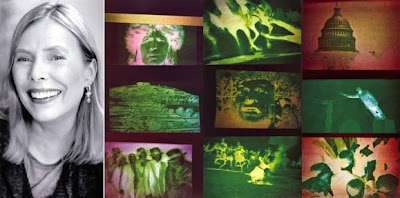 By Michael Wheeler
By Michael Wheeler
This post is not about the art being presented at Luminato. There are a lot of really cool works being presented at the festival and I wish all the artists involved enormous success. Except for Joni Mitchell. What? Joni Mitchell is a visual artist!?!
This post is about money. Cash dollars for the arts. How it is spent, who decides, and for what purpose. I didn’t really understand how off the rails this whole spectacle had gone until I read Kate Taylor’s May 24th , 2008 article From zero to $22.5-million in 2 years in The Globe and Mail.
And then my head exploded.
Taylor begins by answering some of her own questions:
“How did a 10-day Toronto arts festival, which had completed only one season, win a direct provincial grant of a kind usually reserved for established government agencies? How did Luminato, that ill-defined grab bag of splashy public spectacles and pricey international performances (which gets underway for a second season on June 9) come out of nowhere so fast?
The answer is: one part strategy, one part timing, many parts political connections.”
She comes to the conclusion based on the following evidence:
The festival was founded and is co-chaired by Tony Gagliano and David Pecault. Gagliano is CEO of St. Joseph Communications, which publishes Toronto Life, and is also friends with Greg Sorbara, former Liberal finance minister and architect of McGuinty election victories. To complicate matters, his family also donated $10 million to the recent AGO renovation. This is relevant because the three major grants for the arts by the Ontario Government recently have been to the AGO, the ROM and Luminato. There is a strange, out of my just-trying-to-make-rent league, cycle of money going on there.
Pecault is Senior Partner with The Boston Consulting Group but, surprise, is married to Helen Burstyn, a prominent Liberal supporter who used to work inside McGuinty’s office and is now volunteer chair of The Ontario Trillium Foundation, another provincial arts granting body.
These well-connected founders managed to immediately, out of nowhere, get our Ontario government to commit $7.5 million dollars towards this festival over its first three years. What the? Praxis Theatre has to receive three successful project grants before we can even qualify to apply for operational funding. But fine, the post-SARS tourist economy ain’t what is used to be and some stimulus that skips the red tape is perhaps in order. But this latest, no-application process, trust us we’ll do something good with it, extra $15 million dollars – which Luminato admits that they don’t know what to do with yet – is quite frankly beyond the pale.
Here’s the top three reasons why:
First, access to public arts funding should not be political. Public money can’t and shouldn’t be about who you know. We have a hard time making the case for public arts funding period. Why not house the homeless, make the TTC cheaper, and paint some more bike lanes instead? If it begins to be even perceived as a slush fund for political friends to throw exclusive red carpet parties, while they wine and dine international artists, we’re screwed selling this idea to the rest of our citizens. The connection between the co-chairs and the Premier’s office are embarrassingly obvious. For all of us in the arts.
Second, there has been much to do in the media, and on this blog, about what’s wrong with theatre in Toronto as of late. In particular the lack of strong new voices and the conditions many artists work in. Alec Scott’s Toronto Life Article (who publishes Toronto Life again?), comes to mind. A lot of arguments have debated whether or not the criticisms are valid – not much talk about why they could be true. I think the answer is money and access to it. The more people that live here, make plays, and can find a way to live, the more exciting new art will be made. Throwing $15 million at Luminato will do little to address this for Toronto theatre.* If you think you know about the other disciplines being presented at the festival, let me know. It’s going to do very little to address the root causes of what plagues us in Theatretown.
*Note. Yes. The Luminato windfall was immediately followed by a $5 million increase to the Ontario Arts Council yearly budget to deflect this sort of criticism. But consider these #s: With the new money, The OAC distributes $60 million a year to roughly 400 organizations. This is peanuts, we’re talking $150,000 a piece after a rigorous process of peer review. Right now Luminato is rocking along with an average of $7.5 million a year and they just invented themselves.
Third, and most importantly, this is bad strategy. It’s the same kind of Lastman-era flawed logic that got us a basketball team named The Raptors and the notion that somehow we can buy a world class city instead of building one. Hiring a high-priced American Artistic Director to bring World Class shows to Toronto will not put us on the map as an international hotbed of talent. People travel to London and New York for this reason because of the shows that are created there, and the tradition the community has of making great works that push boundaries. That’s when the rest of the world follows suit and tries to participate with it as well. Until we have more legitimate domestic talent, stars, and the hits that go with them, we’re never going to achieve that sort of status.
So I’m Lumi-not-going. There are a bunch of shows, both domestic, and international, that seem really interesting. Normally I probably would check them out. But I’m disturbed enough by all of this to opt out. I’ve got a grant application I should probably be working on anyhow.
This is the first in a series of four blog posts on theatre by Michael Wheeler.
]]>

